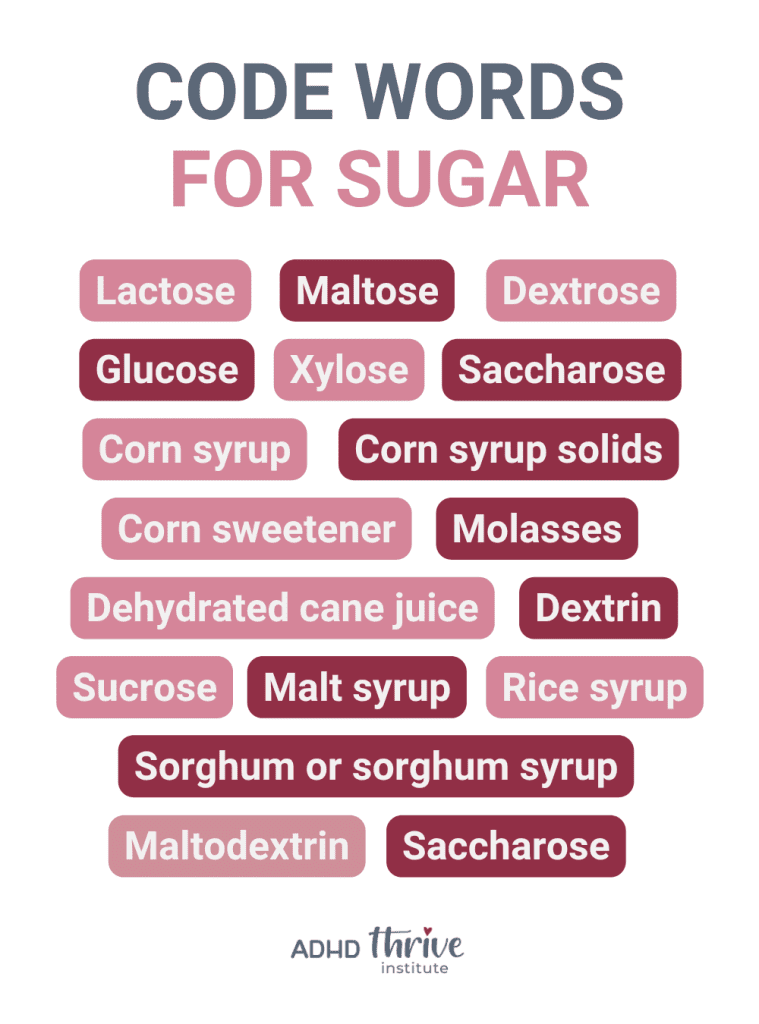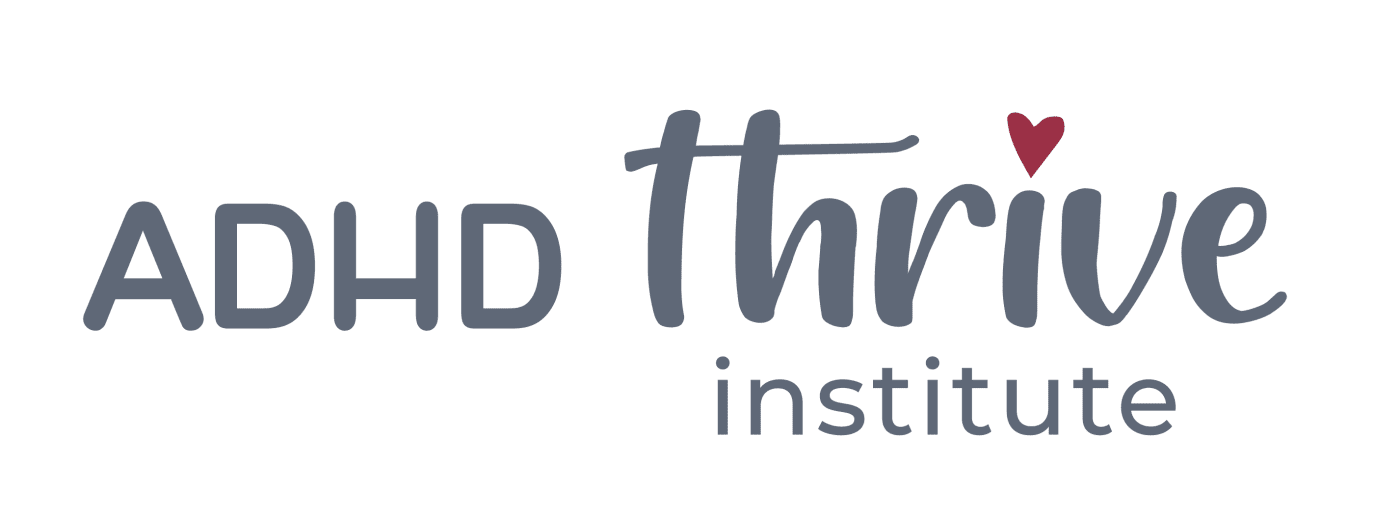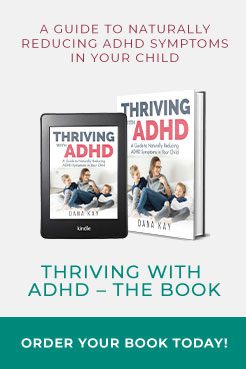“My child only had a cookie. What’s the big deal?”
It’s a sentence I’ve heard from more parents than I can count. And I get it. We’re conditioned to think of sugar as a harmless treat, something kids are “supposed” to enjoy. A reward. A rite of childhood.
But if you’re raising a child with ADHD, that cookie might be doing more than just giving them a little burst of energy. It might be making their ADHD symptoms worse.
The truth is, sugar affects all of us, but for kids with ADHD, it’s a much bigger deal. Their brains and bodies are more sensitive to the highs and lows that come with fluctuating blood sugar levels. When those levels spike or crash (which sugar is really good at causing), it can look a lot like hyperactivity, impulsivity, irritability… or even complete emotional shutdown.
Many of these sugar-driven symptoms look exactly like ADHD. So the question becomes: Is it ADHD…or is it blood sugar?
In this post, we’re diving deep into the overlooked connection between ADHD and sugar and what every parent needs to know:
- Why sugar affects ADHD behavior and executive function
- The difference between simple and complex carbs (and why it matters)
- How dopamine and sugar cravings go hand in hand
- Why even “healthy” foods might be loading your child with hidden sugars
- How to reduce sugar without meltdowns or restriction
- The one daily habit that can dramatically shift your child’s ability to focus and stay calm
If you’ve ever wondered why your child seems to spiral after sweet snacks or why their behavior feels so unpredictable, you’re not imagining things. Let’s explore the science, the sugar, and the simple steps you can take to support your child’s brain and body naturally.
Blood Sugar Isn’t Just a Diabetes Issue. It’s also an ADHD Issue.
When most people hear “blood sugar,” they think of diabetes, but blood sugar regulation matters for everyone, especially for kids with ADHD.
In fact, unstable blood sugar can trigger a cascade of symptoms that look a lot like ADHD:
🔸 Inability to concentrate
🔸 Irritability or emotional outbursts
🔸 Restlessness or hyperactivity
🔸 Fatigue, sluggishness, or brain fog
🔸 Difficulty sitting still or staying on task
Sound familiar? These are the very challenges that many parents of ADHD kids face on a daily basis, and blood sugar might be playing a much bigger role than you think.
Here’s how it works: when blood sugar spikes (usually after eating something high in sugar or simple carbs), your child may seem hyper, anxious, or “bouncing off the walls.”
When blood sugar crashes (as it always does after a spike) they may become cranky, unfocused, or emotionally dysregulated.
What’s worse, these ups and downs don’t just happen after soda or candy (things that we all know are full of sugar). Even so-called “healthy” options like yogurt, fruit juice, or granola bars can cause dramatic swings in blood sugar if they’re packed with hidden sugars.
What the Science Really Says about ADHD and Sugar
Researchers have been studying the connection between sugar and ADHD for quite some time, and the findings are very interesting.
One study 1 concluded that the more sugar hyperactive children consumed, the more destructive and restless these children became. Another study2 showed a clear correlation between ADHD behaviors and children who drank sugar-sweetened beverages.
The Sugar-Dopamine Cycle — Why ADHD Brains Crave Sugar
Another study3 explained well how sugar works in the brain of an ADHD child:
- Sugar is a powerful trigger for dopamine release in the brain. (Dopamine is one of the brain chemicals thought to be involved in ADHD). Eating sugar floods brain cells with dopamine, which feels good, because dopamine is our pleasure/reward neurotransmitter.
- As people consume sugar, their bodies get used to it being there. The brain then builds up a tolerance to the dopamine and will continue to try to get dopamine production back to normal. This is achieved by reducing the number of dopamine receptors, so it will then take even more sugar to produce the same effect, resulting in a resistance that contributes to cravings even more.
- If a person keeps eating sugar, there may be times when brain cells run low on dopamine from being stimulated so frequently. Low dopamine activity is one of the possible causes of ADHD symptoms. This vicious cycle may also lead to binge eating and sugar addiction.
I envision it like the graphic below:

There is good news, though. Regulating blood sugar is one of the most addressable (and powerful) levers you can pull to help your child feel calmer, clearer, and more in control.
Candy in Class? Why Schools Are Getting It Wrong
One mom I work with recently shared something that stopped me in my tracks. She said, “The school is great about respecting our gluten-, dairy-, and soy-free requests. They don’t give him anything without my permission. I’m thankful for that. But today, his teacher asked me to send in more candy. It’s the fourth bag this month. They’re using it to reward the kids for following instructions.”
4 bags of candy in one month…for a child with ADHD!
And this isn’t an isolated case. Across classrooms, from preschool to middle school, sugar is still one of the most common behavioral rewards used by teachers.
Why This Matters (More Than You Might Think)
Here’s the irony: sugar is being used to reward kids for behavior it likely makes worse.
We know that sugar affects ADHD behavior in significant ways. As mentioned above, research shows that sugar consumption is associated with worsening ADHD symptoms, and the more kids consume, the more pronounced the effects. Blood sugar crashes can cause emotional meltdowns, brain fog, and difficulty focusing, all core ADHD challenges.
So when teachers hand out sugar for “good” behavior, they’re unknowingly undermining the very behaviors they’re trying to reinforce.
It’s Not About Blaming Teachers
Most educators have the best intentions, and often, candy is a quick, easy, and budget-friendly way to offer reinforcement. But when it comes to kids with ADHD, this approach can backfire.
Instead of helping children stay calm and focused, sugar may push their nervous systems further out of balance, making regulation even harder.
Parents: You Have the Power to Speak Up
If your child’s school is using candy or sugary treats as behavior rewards, you’re allowed to question that practice.
You can:
- Ask for non-food-based reinforcement strategies
- Share research on the sugar-ADHD connection
- Offer alternative classroom rewards that support regulation (think: stickers, sensory breaks, praise, privilege passes)
No child should have to choose between feeling included and feeling in control of their body and brain.
As parents, we have the power and the responsibility to advocate for better.
Because our kids deserve more than sugar for their efforts. They deserve support that actually helps them succeed.
Understanding Sugar, Carbs, and ADHD—Not All Carbs Are Created Equal
When people think of sugar and ADHD, they often imagine candy bars and soda causing a short burst of hyperactivity, but the real story is more complex.
It’s not just about sugar itself. It’s about how different carbohydrates affect your child’s blood sugar, and in turn, their focus, mood, and behavior.
The Science Behind Simple vs. Complex Carbs

Carbohydrates come in two major forms: simple carbs and complex carbs.
Simple carbs are quickly digested and absorbed. These include things like:
- Candy
- White bread
- Sugary cereals
- Soda and juice
- Processed snack foods
These foods spike blood sugar rapidly, which triggers a flood of energy, followed by a crash. That crash leads to the sluggishness, irritability, brain fog, and mood swings that mimic or worsen ADHD symptoms.
Complex carbs, on the other hand, break down more slowly. They’re found in:
- Vegetables
- Beans and legumes
- Whole grains
- Nuts and seeds
These carbs provide steady energy, helping children with ADHD stay more regulated, focused, and calm throughout the day.
Practical Swaps to Start Today
If your child is used to sugary snacks and lots of simple carbs, this shift doesn’t have to be dramatic overnight. Start with small, sustainable swaps:

Remember: It’s not about no carbs. Instead, it’s about the right carbs.
How Much Sugar Is Too Much for Kids with ADHD? (Spoiler: Way Less Than You Think)
If you’re wondering how much sugar is okay for your child with ADHD, the answer is probably less than you think. According to the American Heart Association4, kids should have no more than 25 grams (about 6 teaspoons) of added sugar per day. But for kids with ADHD, who are more sensitive to sugar’s effects, even that can be too much.
In our practice, we recommend no more than 12 grams (3 teaspoons) of added sugar per day for children with ADHD.
Why? Because even small amounts of sugar can disrupt blood sugar stability, which in turn triggers or worsens the classic ADHD symptoms: hyperactivity, impulsivity, irritability, and difficulty focusing.
The Sneaky Truth: Hidden Sugar Is Everywhere
Even if you’re not giving your child candy or soda, they might still be getting way more sugar than you realize, even in foods marketed as “healthy.”
Let’s take a closer look at a few labels that I saw on some of my local grocery store items:
Yogurt (even dairy-free “healthy” brands) can sometimes have up to 13 grams of added sugar in just 5 ounces. Ketchup can have 4 grams of added sugar in 1 tablespoon. Barbecue Sauce had a whopping 16 grams in just 2 tablespoons. Juice (yes, even 100% fruit juice) had 26 grams of natural sugar in 8 ounces. (While this is not “added” sugar, that’s still a huge spike for the ADHD brain.)
And soda (or pop as some of you reading this might say)…it ranges from 39 to 61 grams of added sugar per can. Crazy, right? That means one soda or juice box can wipe out your child’s entire day’s worth of sugar intake, and then some.
How to Spot Hidden Sugars on Labels
Here’s where it gets even trickier: sugar doesn’t always show up as “sugar” on the ingredient list. It hides behind dozens of sneaky names.
Look out for these code words on ingredient lists:

- Lactose
- Maltose
- Dextrose
- Glucose
- Xylose
- Saccharose
- Sucrose
- Corn sweetener
- Corn syrup
- Corn syrup solids
- Dehydrated cane juice
- Dextrin
- Maltodextrin
- Malt syrup
- Molasses
- Rice syrup
- Sorghum or sorghum syrup
Remember when checking labels, the higher these ingredients appear on the label, the more sugar the product contains.
Reducing sugar doesn’t mean you have to eliminate joy or flavor. It means becoming more intentional about what goes into your child’s body…because what goes in affects how they think, feel, and behave.
Your Action Plan: How to Cut Sugar Without the Backlash
By now, you’ve seen how sugar can throw fuel on the fire of ADHD symptoms and how sneaky it can be in your child’s daily diet.
But here’s the good news: you don’t have to go sugar-free overnight. You just need a plan of action.
This section gives you the real-life, doable steps to reduce added sugar, balance blood sugar, and still keep meals kid-approved.
- Reduce Added Sugar Gradually
Going cold turkey on sugar can cause withdrawal symptoms. Instead, begin by making one or two swaps each week:
- Replace juice boxes with sparkling water + lemon or berries
- Switch sugary snacks for fruit + nut mix
- Ditch sweetened yogurts for plain versions with fresh fruit stirred in
These changes may seem small, but they add up, and they reduce the blood sugar rollercoaster that drives ADHD behavior.
- Build Breakfast Around Protein and Healthy Fats
Cereal, pancakes, and muffins might be fast, but they’re the worst choice for ADHD. They spike blood sugar fast, then crash it just as quickly, leading to mood swings, meltdowns, and poor focus at school.
Instead, start the day with a blood sugar-stabilizing breakfast:
- Scrambled eggs + avocado
- Smoothie with nut butter, spinach, and unsweetened protein powder
- Leftovers like chicken or turkey sausage with roasted veggies
The best diet for ADHD and sugar control is one that includes protein, healthy fats, and complex carbs at every meal. Here are a few of my favorite healthy breakfast recipes for ADHD kids.
- Prioritize Complex Carbs
Unlike simple sugars, complex carbohydrates digest slowly and provide a steady release of energy. Pair complex carbs with protein and fat to help regulate blood sugar all day long, keeping ADHD symptoms in check.
- Keep Snacks Consistent
Snacks can serve as a blood sugar safety net. Don’t wait for your child to crash. Instead, plan consistent, balanced snacks like:
- Apple slices + almond butter
- Carrot sticks + hummus
- Turkey roll-ups + grapes
This helps prevent emotional outbursts and supports executive function and focus between meals.
- Make Smart Swaps for School Lunches
If you’re packing lunches for school, here’s how to keep sugar low and nutrition high:
- Swap fruit snacks or cookies for real fruit + protein
- Trade sugary granola bars for nut-based bars with low sugar
- Skip juice—send a water bottle or add a fruit-infused option
And don’t forget to educate your child on why these choices matter. Empower them to feel good about fueling their brain, not just fitting in.
- Advocate for Sugar-Free Rewards at School
This might be one of the most overlooked ADHD support strategies at school: Talk with your child’s teacher about using non-food rewards instead of candy.
Try:
- Stickers
- Brain breaks
- Extra recess time
- Positive notes home
Most teachers want what’s best for your child. They just don’t always realize how sugar can sabotage progress. Share what you’re learning and offer simple alternatives.
Want to learn more about sugar and ADHD? Tune in to this Soaring Child podcast with special guest, Michael Goran, author of “Sugarproof: Protect Your Family from the Hidden Dangers of Excess Sugar with Simple Everyday Fixes.”

Rethinking Sugar and ADHD—One Small Change at a Time
If you’ve ever wondered whether sugar could be making your child’s ADHD symptoms worse… now you know you’re not imagining it
✔️ Sugar can impact mood, focus, behavior, and the ability to self-regulate.✔️ Blood sugar crashes can look a lot like ADHD.✔️ The typical American diet is loaded with hidden sugars that most of us don’t even realize we’re feeding our kids every day.
BUT…you have the power to change this, starting today.
You don’t have to go to extremes. You don’t have to cut every sweet. You just need to understand how sugar affects the ADHD brain and take small steps to fuel your child with the kind of nutrition that actually supports focus, regulation, and learning.
Want to Learn the Exact Framework I Use to Help Families Reduce ADHD Symptoms Naturally?
Here’s how to get started:
- Watch the Free ADHD Thrive Masterclass – You’ll discover the exact system I’ve used to help thousands of families reduce ADHD symptoms through diet, lifestyle, and targeted support. You’ll walk away feeling empowered and clear on what to do next.
- Or book a free call with our team – Let’s talk through what’s going on with your child and explore how we can help. You don’t have to figure this out alone. We’re here for you.
Because when you support your child’s biology, behavior often follows.
FAQ: Sugar and ADHD – What Parents Want to Know
- Does sugar make ADHD worse?
Yes, for many kids with ADHD, sugar can worsen symptoms like hyperactivity, impulsivity, and mood swings. It causes blood sugar spikes and crashes that affect focus and emotional regulation, two areas already challenging for ADHD kids.
- Can sugar cause ADHD?
Even though sugar might not cause ADHD, research shows it can intensify existing symptoms. Children with ADHD may also crave sugar more due to dopamine imbalances in the brain, creating a vicious cycle of highs and crashes.
- What are the best snacks for ADHD kids to avoid sugar crashes?
Focus on snacks with protein, healthy fats, and complex carbs. Great options include apple slices with nut butter, hard-boiled eggs, hummus with veggies, or turkey roll-ups. These keep blood sugar steady and help prevent ADHD-related mood and behavior dips. Learn more about the best diet for ADHD kids in this post.
- How can I help my child reduce sugar without feeling restricted?
Start slow. Make small swaps like fruit and nuts instead of candy or water with fruit instead of juice. Get your child involved in snack prep and explain how foods affect their brain. It’s about feeling better, not missing out.
- Why is blood sugar important for kids with ADHD?
Blood sugar stability plays a huge role in behavior and focus. Spikes can cause hyperactivity, and crashes can lead to irritability and brain fog, both of which mimic or worsen ADHD symptoms. Managing blood sugar is a key part of ADHD support.
Resources:
1 Prinz, Robert, et al. “Dietary Correlates of Hyperactive Behavior in Children.” Journal of Consulting and Clinical Psychology, vol. 48, no. 6, 1980, pp. 760–769.
2 Yu CJ;Du JC;Chiou HC;Feng CC;Chung MY;Yang W;Chen YS;Chien LC;Hwang B;Chen ML; “Sugar-Sweetened Beverage Consumption Is Adversely Associated with Childhood Attention Deficit/Hyperactivity Disorder.” International Journal of Environmental Research and Public Health, U.S. National Library of Medicine, 4 July 2016, https://pubmed.ncbi.nlm.nih.gov/27384573/
3 Johnson, Richard J, et al. Attention-Deficit/Hyperactivity Disorder: Is it Time to Reappraise the Role of Sugar Consumption? Sep 2011, https://www.ncbi.nlm.nih.gov/pmc/articles/PMC3598008/
4 Jones, T W, et al. “Enhanced Adrenomedullary Response and Increased Susceptibility to Neuroglycopenia: Mechanisms Underlying the Adverse Effects of Sugar Ingestion in Healthy Children.” The Journal of Pediatrics, vol. 126, no. 2, 1995, pp. 171–177.
3 Del-Ponte, Bianca et al. “Dietary patterns and attention deficit/hyperactivity disorder (ADHD): A systematic review and meta-analysis.” Journal of affective disorders vol. 252 (2019): 160-173. doi:10.1016/j.jad.2019.04.061
4 “Kids and Added Sugar: How Much Is Too Much?” The American Heart Association https://www.heart.org/en/news/2023/05/23/kids-and-added-sugars-how-much-is-too-much
5 Del-Ponte, Bianca et al. “Dietary patterns and attention deficit/hyperactivity disorder (ADHD): A systematic review and meta-analysis.” Journal of affective disorders vol. 252 (2019): 160-173. doi:10.1016/j.jad.2019.04.061
6 Alireza Farsad-Naeimi, Foad Asjodi, Mahsa Omidian, Mohammadreza Askari, Mehran Nouri, Ana Beatriz Pizarro, Elnaz Daneshzad. “Sugar consumption, sugar sweetened beverages and Attention Deficit Hyperactivity Disorder: A systematic review and meta-analysis” Complementary Therapies in Medicine, Volume 53, 2020, 102512, ISSN 0965-2299, https://doi.org/10.1016/j.ctim.2020.102512.







